#drafting
Text
It has recently occurred to me that to make a second draft after the first one I have to... rewrite the entire thing?? Not just, take the document and, edit ON IT, OVER it.
And that a first draft is not really supposed to be... readable?
Guys I need help,.how do you do drafts??
1K notes
·
View notes
Note
Hey, so i'm working on my first WIP, and i wanted to ask about drafting. When can one consider their first draft done? Does it have to have the goal word count (ie; 100K), or would being about halfway there be considered a good enough first draft, that i can move on to the second and start editing?
Concluding each stage of the writing process
It's difficult to know when a phase of a writing project has concluded and you're ready to focus on a new objective as it's developing. I tend to approach my writing projects with a clear and uniform trajectory, regardless of how diverse my projects can be. This approach allows me to remain focused, thorough, and reassured that I am covering all my bases in an organized fashion. However, it also maintains space for me to be explorative and intuitive when necessary. In regards to word count, I don't think it's entirely relevant unless you're determined to adhere to strict genre conventions. Give your story the space it needs and not an extra inch.
(Optional) Zero Draft
In this phase, you're telling yourself the story. You're doing it quickly, messily, intuitively, and forgivingly. Explore every idea that glows in the dark for you, don't throw anything away or discount any possibility. Exhaust your imagination in this phase so that when you reach the first draft, you know you're making informed decisions.
First Draft
You're crafting the structure and core elements of the story. This is often the phase of discovery. You're becoming acquainted with your characters and how they interact, you're beginning to feel at home in the world and settings you've built, and you're seeing all sides of the conflict as it evolves. The goal here is settle on a beginning, middle, and end point, and by the end of this process you want to know your characters' motivations and relationships inside and out.
Second Draft
Go back quickly through the first draft and address any points where you got stuck, where you compromised for the sake of carrying on to the end, and fill in any apparent blanks. The first time you really iron something out, there will always be a few pesky creases. This is the time to find and flatten them.
Third Draft
This is where you question everything. Identify and scrutinize your decisions, dive into the "curtains are blue" discussions with yourself, and begin to tidy up things like grammar, clumsy dialogue, over-poured descriptions, and dubious vocabulary. Comb through each paragraph and be brutal, prioritizing clarity and intentionality of how you've told the story.
The Read Through
This is the point where I recommend doing three things:
Letting it rest away from you for 1-3 months so that you can return to it with a bit of unfamiliarity and new perspective.
Hand it off to a couple of trusted readers and give them ample time to read, digest, and craft some feedback
Reread the project once all the way through making no changes (although annotations are acceptable)
Fourth Draft
Finishing touches. Vigorously and meticulously scrub and scrape between the lines and imagine giving it to your worst enemy. If you can imagine any mean (but valid) things they could conceive of to say about it, this is the time to grapple with or fix those details.
Additional Resources
Guide to Drafting
Word Count/Productivity Tracker Spreadsheet
Balancing Detail & Development
Writing The First Chapter
Writing The Middle of Your Story
Powering Through The Zero-Draft Phase
Writing The Last Chapter
Chapter Length
Happy drafting,
x Kate
466 notes
·
View notes
Text
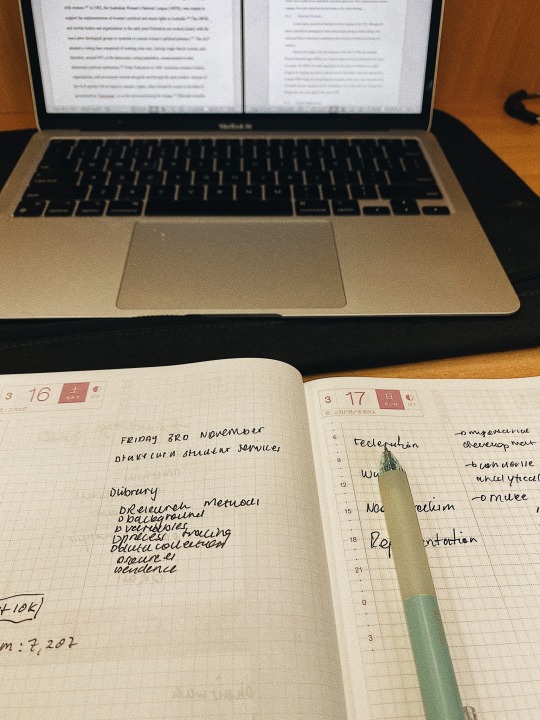

04.11.2023—been struggling with motivation recently, but it’s been getting better. so close to the finish line
#studyblr#studyspo#study notes#study motivation#bullet journal#study blog#athenastudying#stationery#studying#study#library#dark academia#heysucculent#heyxmissxjude#heyscholarly#heyaltin#thesis#writing#drafting#essays#heycazz#heychenleyah#heybeliada#heybirb#heybenni#heyiri#heyaestudier#productivity#college#university
297 notes
·
View notes
Photo

Greetings From The House Of Weyhe, 1929. Howard Norton Cook, 1901-1980. Pencil Woodcut Engraving on Washi paper.
598 notes
·
View notes
Photo

#writing#writer#young writer#aspiring author#writing advice#writing motivation#writing inspiration#writing inspo#writers#novel writing#book writing#creative writing#draft#first draft#drafting#you can write#writing takes time#writing takes patience#you are a good writer#practice makes perfect
5K notes
·
View notes
Text
Keep going
...even when the draft feels bad. That just means you've refined your eye for what makes "good" writing. You can always edit later!
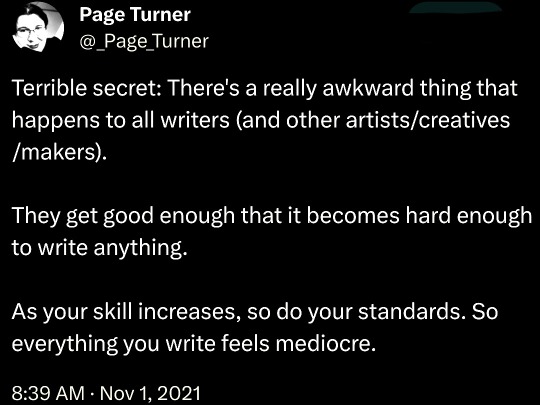
Terrible secret: There's a really awkward thing that happens to all writers (and other artists/creatives/makers). They get good enough that it becomes hard to write anything. As your skill increases, so do your standards. So everything you write feels mediocre.
The weird part is that this "mediocre" writing is far better than what you were writing before. You have just moved the goalposts on yourself as you improved. So you have to learn to give yourself permission to write anything. Even if you think it's bad.
What usually happens at that point is that you either:
A) end up not writing badly at all and surprising yourself with what you manage to produce, or
B) create something that has issues but is easily editable later on into something that meets your standards.
But wow, is it a gnarly adjustment to ignore that emotional reflex of "this sucks, I suck" and press on anyway.
I do find myself frequently wondering how many writers reach this awkward phase, believe wrongly that they suck, and never write again - just at the point when they're starting to get good! I'd imagine A LOT of them.
And no, this doesn't just happen with writing. It happens with every kind of artist and craftsperson. People tend to quit just as they're getting good, because their standards have raised along with their skills.
You've got this.
source tweet thread: X
279 notes
·
View notes
Text
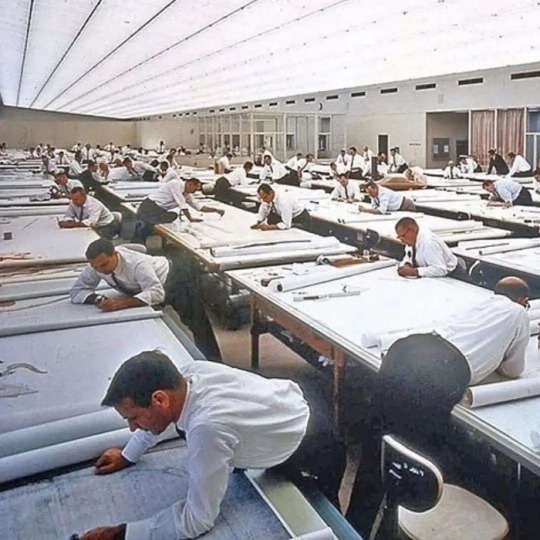
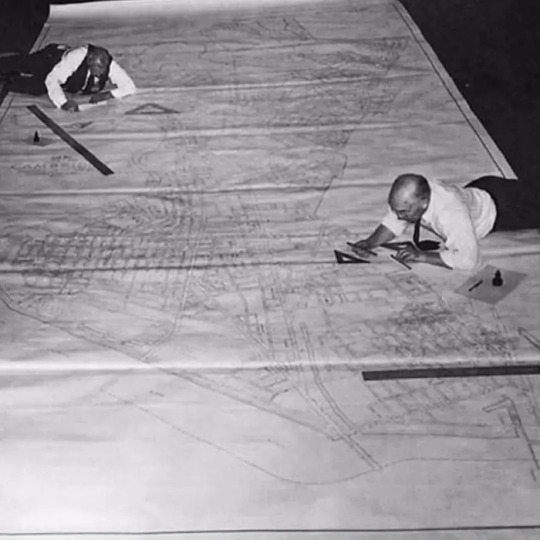
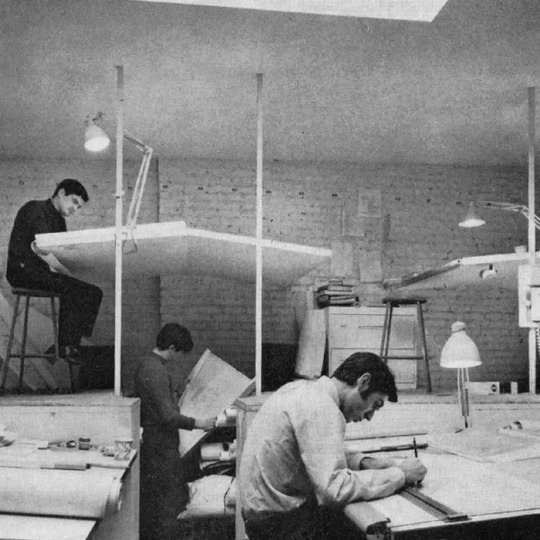

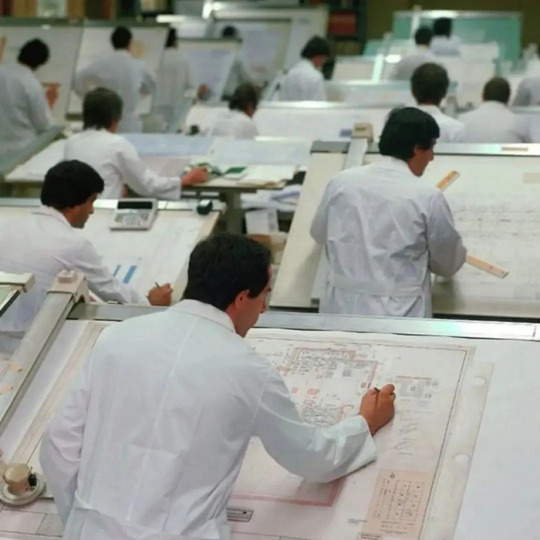
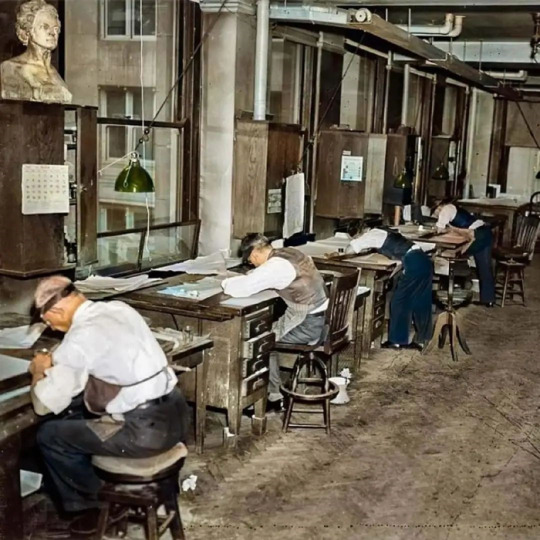
Life before AutoCAD (source)
189 notes
·
View notes
Text
Writing Tip #21
Every character is the main character of their own story. Write a scene from their perspective to flesh them out if needed.
{I’m posting a writing tip every day of NaNoWriMo}
#writing#writer#nanowrimo#author#novel#camp nanowrimo#draft#drafting#tips#writer things#reading#amwriting#writing things#fantasy#writing help#writing tips#book#nanowrimotips#nanowrimotip#reader
550 notes
·
View notes
Text
How to Create and Customize a Raglan Top or Dress Pattern [Beginner-Friendly]
In this post , you will learn how to self draft and hack sewing pattern for raglan dress or top.
A raglan top or dress is a garment that has sleeves that extend to the neckline, creating a diagonal seam from the underarm to the collarbone. They are flattering and comfortable styles that suit any body type.
In this post, you will learn how to create a raglan top or dress pattern from scratch.…

View On WordPress
#beginners tutorial#blouse tutorial#draft#drafting#dress tutorial#for beginners#pattern drafting#pattern hack#pattern making#raglan#raglan dress#raglan top#self draft#sewing pattern
36 notes
·
View notes
Text
Getting back into creative writing
So if anyone ever finds themself in the "hey I got too overwhelmed by Life tm and had to drop creative writing, but I miss it and I want to go back but I'm struggling to pick up where I left of" kinda situation, I got a few tips that might be worth a try (noting of course that everyone's brains work differently and all that so if these don't work don't worry about it too much - you WILL get back into it, it's just that you might need a different solution
1 - Look at some of your old projects
Did you have any kind of mood boards, incorrect quotes, outlines, prose from a project you wanna get into or you remember enjoying working on? Check them out again! Sometimes getting back into the process is hard because you're out of touch with the characters or world or plot which can make forward progress feel way more daunting. So explore what you have down already, and if you feel inspired, add to the collection - no pressure of course :D
2 - Make it REALLY easy to work on your project
For example, if you're working on plotting, set up a timeline with sticky notes somewhere where you can leave it up for weeks at a time. If you get an idea, jot it down on the sticky note and then place it on the timeline in approximately the spot you think it would fit. You can see progress growing, and if you only have one idea in a day, you can still make use of it without having to go too out of your way to make it happen. Or if you're in the drafting phase, an option could be to leave the doc open so you can just get right back into it if inspiration strikes.
A lot of writing advice will talk about how this is a craft about discipline, about how habits built inspiration, and if you're trying to write as a full-time career, then yeah that's probably true. But this is about getting into it as a passion again and that's the kind of thing that can be done better (in my experience) from a sense of excitement and freedom rather than one of commitment. So this tip is more about maximizing how far inspiration alone can go without worrying too much about the other stuff - that can come later.
3 - Find some people to encourage you
I'm going to differentiate here between "encourage" and "hold you accountable." Remember - the goal here is to make writing feel like a natural and exciting part of life again, rather than another thing to add to the to-do list. So these people are going to be the ones that cheer you on when you make progress or do something cool, rather than the ones who press you to keep writing, writing, writing. Though if you build up steam in the future and want to transition, that is always an open option.
4 - Try different forms
Creativity is creativity. If the specific type of creative writing you used to do isn't working for you right now, try other styles. Maybe you want to do longer form if you used to do short stories, or vice versa. Or switch it up between original fiction and fan works. See what sparks the most joy and run with it.
#writing#writing tips#writing advice#writeblr#writers on tumblr#getting back into writing#writing slump#fanfiction#original fiction#short stories#longform stories#encouragement#outlining#drafting#wips#blorbo#returning to old projects#mental health#life tm#olive's writing vibes
671 notes
·
View notes
Note
I want to write a story, but i cannot decide on which pov/person i should write. I feel like first person would be perfect, but then i want to keep certain informations secrets to the readers, so i thought maybe third person, but it’s not as fluid as first person is… how do i choose? Any tips?
Choosing point of view for your story
I am in the unique position of having exactly what you need. Here is my series of Guides on Point of View which detail my main tips, resources, and answered questions about each option as far as POV:
Guide to Writing First Person Point of View
Guide to Writing Third Person Point of View
Guide to Writing From Multiple Points of View
and some additional resources:
Pros & Cons of Different Points of View
Showing VS Telling in First Person POV
There is an absence of s guide to second person because it is much less common, but I would be happy to create it if readers show some interest
Best of luck,
x Kate
251 notes
·
View notes
Note
How do you learn to get better at your craft when your writing a SFD? Does getting better at writing techniques (like metaphors, dialogue, etc…) come in the revision stages?
broadly speaking, the better you get at writing, the worse you get at writing. i used to be able to sit down and write a story and be pretty happy with it. nowadays i can't write anything without at least 3 drafts, but that's because i write faster and uglier. so in that way, yes, the pretty prose* comes in the revision stages. in my early drafts i would say only 1 in 100 sentences is a banger that makes it through to the final draft.
*i don't actually write pretty prose but you get what i mean.
however, i think the best way to improve on techniques is to practice them individually. for example, i wrote a story where my only goal was practicing similes, and that exercise pretty much solidified my ability to write similes--not just what makes them effective, but when they're needed and when they're not. that story became pretty successful for me; i published it and it won an award. but i also wrote a story where i tried fully external narration and failed miserably. it's all just practice.
for things like imagery, voice, style, etc. your best bet is to create a self study of it. start with research: find craft essays about it, read some bad advice about it (which you won't abide but which will give you Opinions). find examples where an author does that specific thing in a way you really admire, and read it paying very close attention to that thing. then create an exercise for yourself where you practice what you've learned.
66 notes
·
View notes
Text

Look what just arrived!
All purchased through Bookshop.org, which... apparently lets any random person do affiliate links? So here, I made one, with all the books I've been buying: Nixy's Recs
(Bookshop.org is an online bookstore that ensures profits are all directed to small, local bookstores instead of behemoths like Amazon or B&N. You can choose a store in your area to shop 'from,' or just allow the profits to go into the a more general fund that gets distributed evenly to all bookshops in the system. This post by @ebookporn and @batmansymbol does a great job explaining how it works.)
Strong Towns and Walkable City are both books I found through the Strong Towns YouTube Channel. I haven't read these yet (they only just arrived yesterday), but if they're at all like the videos, then I have high hopes.
And here are the specific books (again, affiliate links, which I've never done before but here goes):
The Keystone Jacket and Dress Cutter: An 1895 Guide to Women's Tailoring by Chas Hecklinger (Author), Kristina Seleshanko (Preface by)
Walkable City (Tenth Anniversary Edition): How Downtown Can Save America, One Step at a Time by Jeff Speck (Author), Janette Sadik-Khan (Introduction by)
City Planning: A Very Short Introduction by Carl Abbott (Author)
Strong Towns: A Bottom-Up Revolution to Rebuild American Prosperity by Charles L. Marohn (Author)
#books#bookshop.org#walkable city#strong towns#fashion history#drafting#pattern drafting#city planning#phoenix recs#product reviews#kinda
125 notes
·
View notes
Photo

Northwestern Elevation drawing for Price Tower, Bartlesville, Oklahoma, 1952. Frank Lloyd Wright. Ink and colored pencil on paper.
#frank lloyd wright#Architecture#drawing#drafting#plan#oklahoma#1950s#art#unique#pencil#mid century#modernism#futurism
247 notes
·
View notes
Text
I think I get to have you in another life
So I’ll say I love you from here
From my empty bed
From my quiet apartment
I love you, my darling
Enough to reach across timelines
I love you in whispers in the dark
I love you in reaching for you in my dreams
I love you I love you
From here
21 notes
·
View notes